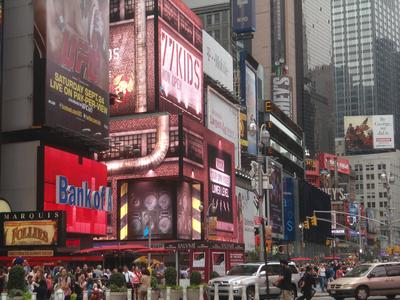We are developing the social individualist meta-context for the future. From the very serious to the extremely frivolous... lets see what is on the mind of the Samizdata people.
Samizdata, derived from Samizdat /n. - a system of clandestine publication of banned literature in the USSR [Russ.,= self-publishing house]
|
As has been widely reported, Standard and Poor’s (S&P) credit rating agency is under criminal investigation for the “crime” of rating various financial instruments as low risk (“triple A”) when, in fact, these financial instruments were based on worthless mortgages (worthless as the original home loans were paid to people who had very little chance of ever paying them back).
No doubt S&P did not do their job of rating risk very well. After all S&P is part of a de facto government established cartel of ratings agencies (the vast level of regulation makes very difficult for new companies to compete in the credit rating business) and the government wanted its “affordable housing” policy to continue and part of that was for the original lenders (the banks and other such who had made loans to people who could not pay them back – partly to avoid legal action under the Community Reinvestment Act and partly because the Federal Reserve system was making lots and lots of cheap credit money available and it had to go somewhere) to be able to pass on the loans as securities and other financial products.
Also, of course, S&P (like the other ratings agencies) is paid by the people it is rating (not the people who want to check credit worthiness) so it has a perverted incentive to not look too closely at the financial products it rates – and the mortgage backed financial products (i.e. the pass-the-parcel-before-it-blows-up products) paid very well – especially as financial people (as financial people are apt to do) were using the mortgage based financial products as the basis for pyramid schemes – building vast constructions of debt upon them.
However, every single word of the above could be applied to the larger “Moody’s” Credit Ratings agency. For example, it was the credit rating enterprise that rated the (utterly demented) government backed (and government created) “Fannie Mae” and “Freddie Mac” (the organizations that own most American home loans) as perfectly safe.
Yet Moody’s is not under criminal investigation – why not?
By an odd coincidence S&P downgraded American government debt about a month ago – and (after observing the hostile reaction of the American government) Moody’s chose not to. Could this (as some have claimed) be the latest example of the “Chicago Way” where commercial “friends” get rewarded politically – and “enemies” get punished?
The existing regulations already gave the government (via such agencies as the SEC) vast (and, to a great extent, arbitrary) power. But the passing of “Dodd/Frank” (an Act of Congress named after, arguably, the most corrupt members of the Senate and the House of Representatives at the time) completed the process of turning the American financial system and markets it a political toy – totally under the control of the government. And presently it is a very corrupt government – dominated by Chicago Machine people (from the President down).
However, it is hard to have much sympathy for the financial companies and traders – they are, after all, addicted to government subsidies and have long stopped being anything to do with “free enterprise”.
For example, whenever a vast new government subsidy orgy is announced (such as a new round of funny money creation by the Federal Reserve – or a promise of a vast bailout for European banks) the markets go up not down. The long term is of no interest to most players on the market – they care only about the new money that government creates (from nothing) and their personal chances of getting some of it.
They (most of the financial elite) and the governments (for the other governments are much the same as the American one) are made for each other – it is just a shame that the rest of humanity has to live on the same planet as these people.
“The great problem of recycling anything is that whatever it is that you’re after might be extremely dispersed. You can end up epending more energy, more labour, in trying to oncentrate it enough to recycle it than you would expend by simply digging up some new stuff.”
Tim Worstall on the issue of recycling rare metals. The point he makes very well, in my view, is the issue about the scarcity of time. It takes oodles of time for people, even in their own households, to recycle stuff and sort it out, as opposed to acquiring material elsewhere. Now, if the value of the recycled stuff rises sufficiently to make it worth the while of people to recycle it, or the availability of dumping grounds for unwanted stuff declines sharply, the of course recycling will increase.
Everything has a cost. And time is one of the costs that legislators frequently don’t stop to address.
The fallacy at the heart of this crisis is that every financial problem has a political solution.
– Jeff Randall He’s talking about the euro’s problems, but the same fallacy is at work nearly everywhere.
My only surprise is that an article as justifiably angry as this has not been written sooner. Here are Peter Oborne and Frances Weaver, in the latest edition of the Spectator. They have also penned an item called Guilty Men, published by the Centre for Policy Studies.
There are several institutions that are targeted. And I almost wonder if the authors of the article have been channelling our own Paul Marks on the subject of the Financial Times. Paul has written about the Economist also with venom. An example of what annoyed Paul about the Economist, is linked to here.
Here are the paragraphs that stood out for me in the Spectator article:
“Meanwhile the pro-Europeans find themselves in the same situation as appeasers in 1940, or communists after the fall of the Berlin Wall. They are utterly busted. Let’s examine the case of the Financial Times, which claims to be Britain’s premier economic publication. About 25 years ago something went very wrong with the FT. It ceased to be the dry, rigorous journal of economic record that was so respected under its great postwar editor Sir Gordon Newton.”
“Turning its back on its readers, it was captured by a clique of left-wing journalists. An early sign that something was going wrong came when the FT came out against the Falklands invasion. Naturally it supported Britain’s entry to the Exchange Rate Mechanism in 1990. In 1992, under the slow-witted editorship of Richard Lambert (in a later incarnation, as director general of the Confederation of British Industry, Sir Richard was to become one of the most sycophantic apologists for Gordon Brown’s premiership), it endorsed Neil Kinnock as prime minister. It has been wrong on every single major economic judgment over the past quarter century.”
“The central historical error of the modern Financial Times concerns the euro. The FT flung itself headlong into the pro-euro camp, embracing the cause with an almost religious passion. Doubts were dismissed. Here is the paper’s supposedly sceptical and contrarian Lex column on 8 January 2001, on the subject of Greek entry to the eurozone. ‘With Greece now trading in euros,’ reflected Lex, ‘few will mourn the death of the drachma. Membership of the eurozone offers the prospect of long-term economic stability.’ The FT offered a similar warm welcome to Ireland.”
“The paper waged a vendetta against those who warned that the euro would not work. Its chief political columnist Philip Stephens consistently mocked the Eurosceptics. ‘Immaturity is the kind explanation,’ sneered Stephens as Tory leader William Hague came out against the single currency. Even as late as May 2008, when the fatal booms in Ireland and elsewhere were very obviously beginning to falter, the paper retained its faith: ‘European monetary union is a bumble bee that has taken flight,’ asserted the newspaper’s leader column. ‘However improbable the celestial design, it has succeeded in real life.’ For a paper with the FT’s pretensions to authority in financial matters, its coverage of the single currency can be regarded as nothing short of a disaster.”
An interesting side point is that the authors seem to take it as read that individual countries should, as matters of sovereignty, have their own currencies. What the authors don’t state – and I don’t know their views on this – are their opinions on fiat money per se. It is, after all, not much consolation to supporters of free markets to replace one dud monopoly money system with a network of national monopoly fiat moneys instead. What we need is actual competition between and even more crucially, within countries. Remember the old idea of a hard money “parallel currency” that the likes of Nigel Lawson, former UK Chancellor of the Exchequer, toyed with?
Transnational currencies such as the euro may indeed be disasters waiting to happen. But national currencies can often blow up too, or devalue slowly but insidiously. That point needs to be made loud and clear. The end of the euro may be cause for grim satisfaction in some corners but that is not the only kind of economic folly out there.
Interesting piece by Diana Hsieh about Republican candidate Gary Johnson. As far as I can tell, he’s better than Ron Paul.
After parting from Jim Bennett at the Roosevelt Hotel, I had to get a shot of this classic bit of Capitalism. You feel wealthy just looking at it.

There is just a classy sexuality to the old Rolls that could never come out of the greyness of socialism.
Photo: copyright Dale Amon, All Rights Reserved
Instead of staying underground and taking the S train, I walked back through midtown. I always enjoy just passing through Times Square. It is never the same twice. Today I was surprised at the big Xinhua News adverts on the highest and probably priciest of the computer screens which have come to dominate the place.

I sometimes wonder if I am in Times Square or crossed over into a Cyberpunk novel.
Photo: copyright Dale Amon, All Rights Reserved
The screens now cover the entire surfaces of some buildings in constantly shifting images.

New York or Shanghai? The world just keeps shrinking.
Photo: copyright Dale Amon, All Rights Reserved
I had to stop and take a photo of this advert on the wall of the 42nd Street Metro station near the stairs down to the A Train platform. I should not have been surprised by it, given that the Palestinians were asking the UN to tell them they are a State. In my opinion, based on what I hope happens out in the solar system with some Libertarian settlement someday, you do not ask the UN to be a state. You tell them. Of course the other side of this coin is that you try to make friends with your neighbors because if you shoot at them in a Libertarian world, they *will* shoot back…

Is it really peace with Israel they want or is it Israel in pieces?
Photo: copyright Dale Amon, All Rights Reserved
Jim Bennett was in town the last few days for a small and intense colloquium in which he had the opportunity to interact at length with Vaclav Klaus, the outspoken free-market President of Czechoslovakia. It was not until Saturday morning that we were able to get together and I arranged for Taylor Dinerman, one of our sometimes Samizdata writers, to join us for lunch. Given the nature of our conversation over burgers and Guinness I half expected to see leftish types holding their hands over their ears and running for the doors lest they hear free-market, pro-capitalist ideas. Why, one of our motley threesome was even an outspoken Republican. Oh, the Horror, the Horror!
Neither Jim nor I have had an opportunity to make the pilgrimage to the World Trade Center site in some years. I have less excuse than Jim on this matter as I pass through Manhattan so often. I just have not ‘got around to it’.
There is no comparison between what I last saw and now. When you walk down Church Street and arrive at Vesey street the new building is just THERE. For me the mood for the visit was set by the passenger jet which just happened to pass by in the frame as I took one of my first series of photos.

This image set my mood for a somber remembrance.
Photo: copyright Dale Amon, All Rights Reserved
The other buildings are equally fine and are rising quickly as well.

I just liked the framing…
Photo: copyright Dale Amon, All Rights Reserved
We had some difficulty figuring out where to go for a view of the new museum but finally did find one.

First glimpse of the new museum.
Photo: copyright Dale Amon, All Rights Reserved
In the process we also found much better sight lines for the new complex.

When complete this is going to be a magnificent set of buildings.
Photo: copyright Dale Amon, All Rights Reserved
You are never far from something which reminds you of the gravitas and the sheer holiness of this place. Reverent songs will be sung on planets of far stars of the courage of the Fireman of New York.

We will never forget.
Photo: copyright Dale Amon, All Rights Reserved
Although I took a number of photos with Jim in them, I liked the backdrop in this even though he was somewhat dwarfed by it. I do not think Jim will mind.

Author and pioneer space entrepreneur Jim Bennett.
Photo: copyright Dale Amon, All Rights Reserved
I have been following news on China’s supposed near monopoly on rare earth elements for some time now and reports like this one seem to bear out my opinion that things will settle out quickly. There are other projects around the world which can produce these important high technology elements. They have only been kept out of production because the Chinese were selling at prices lower than Western production could support.
So the good news is, we got materials at low prices from the Chinese for years and created new wealth from them. And the other good news is, their attempt to extract a windfall profit is likely to fall on its face. And even better news is that one of the important new mines will be in Nebraska so even if the National Socialist Republic of California pushes prices from the old mines there into a range that keeps them closed, we will still be pulling them out of the ground in one of the Free States.
“It is not beyond Germany’s financial power to rescue the ailing eurozone countries. But the increase in political power for Germany which such a rescue implies is surely way beyond what most of the people of Europe would accept. The Germans do not want it either: in agreeing to create the ECB, they willed the means, but not the end. Now that the end is nigh, they are terrified. What Europe faces, then, is a disaster that was predictable – and predicted – and is now unavoidable. In the process, millions will lose their jobs, an entire generation will miss the opportunities which their parents enjoyed, and blood will probably be shed. The rulers of Europe have never been so wrong since the late 1930s.”
Charles Moore. His remarks about such EUrophiles such as Chris Patten (remember that pompous arse?), FT journalist Lionel Barber, Hugo Young and of course, Jacques Delors (remember him also?) are gloriously scathing.
By the way, here are two books, one by John Laughland, and the other by Bernard Connolly, written some time ago on the architects of the modern EU. I don’t agree with all of their ideas, but they were remarkably prescient in certain respects. Laughland, for example, picks up on Hayek’s point about the dangers of politicised money, which is essentially what fiat money usually is.
In case anyone asks, I certainly don’t endorse Laughland’s nationalistic views on the treatment of people such as Slobodan Milosovic. . That is a subject for another day.
Strange is it not? We get some small backing of commercial procurement of space services from the current NASA administration and what do Republican’s do? Why they back the same old Socialist space approach that came into being to match the Russian Socialist model in the Moon race.
Then they try to hang the monstrosity of a super heavy lift vehicle on NASA… but this time around the parentage is quite clear. Certain Senators designed this vehicle, or at least set the parameters. NASA did not even want the thing, or at least the people at the top did not. (Admittedly, there are a lot of folk in the lower hierarchy and at the Centers who have lived their lives in a ‘government knows best’ cocoon and who think the solution to every problem in exploration is a bigger rocket.)
The current system is an utter bollocks. The Senate insisted NASA come up with a design; and behind the scenes it was made clear that it must contain solid rocket engines made in Utah. It also includes features that ensure an ongoing standing army to service it in Florida and crowds of workers for Tennessee and Texas…
It will never fly. The sole and single purpose of this vehicle is to employ people in those States. When the unbearable cost of this ridiculous Senatorial design becomes apparent to all, it will be cancelled. There will then be hearings, hand wringing… and they will try to foist a ‘new’ program on us to keep the pork barrel jobs going.
This frankenstein will cost $30B over its life cycle. It will fly every only once in every one or two years; it will require a standing army that will be training and working and getting paid in the mean timel; it will cost perhaps $2B per flight; it will suck up most of a declining NASA budget at the expense of everything else; and it will not take a human being into space until 2021.
Yes, folks, this is your Senate at work. Not NASA… this time at least.
I enjoyed listening to this Mark Steyn radio interview the other day. He gets seriously worked up and he’s very effective in that medium, as well as in print. The show that I link to here has its advertisement segments. One ad, for some sort of investment trading product, talks about all kinds of clever trading ideas, but it had this jarring note, if I remember: “You don’t get rich by saving money”.
That’s the current financial disaster in a nutshell. Saving money, accumulating wealth and investing it in productive assets such as businesses, is for saps. And with negative real interest rates (thanks to Messrs Bernanke, Greenspan and chums), saving money in the traditional way is a mug’s game.
When the culture of steady wealth accumulation and savings is mocked like this, it adds up over time.
Recently a friend told me something about kibbutzes (kibbutzim?) in Israel, which got me into speculation mode. My friend had, he told me, met quite a few people in the course of his various globetrottings who, attracted by the aura of idealism and general world-savingness that kibbutzes radiate, had spent time in a kibbutz. Such pilgrims, said my friend, had quite soon left, all of them disgusted by the experience. Far from being havens of a higher form of humanity, kibbutzes are incubators of nastiness and personal backbiting and unpleasantness of all kinds. Kibbutz life, said these people, had cured them of socialism for ever. Which makes me speculate that kibbutzes are, for this reason, a spectacularly good thing, for the people thus inoculated, and for the world, in more ways than I can count in a short blog posting.
The only kind of people said my friend, who live well in kibbutzes are, well, the kind of people who live well in kibbutzes. People who thrive under totalitarian socialism, basically. Good at politics, good at screwing people without appearing too obviously to screw them, in accordance with the rules of rigid egalitarianism. There are lots of rules, to suppress individualism, getting ahead, getting richer, and so on, and the individuals who understand these rules use them ruthlessly to get ahead, and even, if you are flexible about how you measure wealth, to get wealthy.
These “alpha personalities”, as my friend described them, stick around, ruling the kibbutz with a rod of egalitarian iron. Many of the people lower down the Greek alphabet, without whom these alphas would presumably be rather helpless, are the transients, some of whom my friend had talked with. Young idealists, for whom life on a kibbutz is some kind of rite of Jewish passage. They arrive, serve their time until they can stand it no longer, and leave, taking with them an education in the realities of egalitarian collectivism that is given to few others in what is basically, still, a moderately free world. They experience such a regime good and hard, in a form that they can contrast with a life outside that kibbutz that is still massively freer, and then leave, taking that knowledge with them.
So, in addition to being one of the great new hubs of technological innovation in the world, the state of Israel, by permitting with its laws (including, presumably, a law which says that kibbutzes may not imprison those who no longer consent to being there), and encouraging with its ideological traditions, master classes in the realities of collectivism, is doing the world another huge favour. Kibbutzes are, you might say, re-education camps for precisely the sort of people who most require such re-education, and at a time in their lives soon enough to make a huge difference, to them and to the world.
I am a huge admirer of that human semi-collectivity called Jews, and pretty much an uncritical supporter of the state of Israel in its ongoing struggle to stay in existence and to flourish. But, and please do not misunderstand this next bit, I sort of agree with some of the more admiring bits in the ravings of the world’s many anti-semites, present and past. Jews are rather special. A century ago or so, Jews did have an influence on the world that was far greater than their mere numbers would seem to have allowed. (I am a classical music fan, and the sheer scale of the Jewish presence in that world has been and remains extraordinary.) It did not follow from the super-achievements of Jews that therefore the Jews were evil and should all be murdered, and it does not follow now. But, they were a group of people very much to be reckoned with, and they surely still are, again way beyond their mere numbers in the world.
I therefore now surmise that an ongoing education programme, which turns energetic, adventurous and idealistic young Jews from devotees of collectivism in devotees of something more like the opposite, has got to be one of the very best things now going on in the world.
But, this is pretty much all speculation on my part. The question mark at the end of my heading is no mere afterthought. I admire Israel from afar, but have never been there, nor have I travelled very much in the world. (Maybe if I spent more time in Isreal, I would admire it less.) So I end with all the usual questions which thinking-aloud, but-what-do-I-know?, guess postings of this kind generally do and always should end with. Does any of the above make sense to any of our commentariat? In particular, how do the above speculations strike any readers of this who have pertinent knowledge of the matters I speculate about, of the sort which I do not have, beyond that small item of chat from a friend?
I can well imagine that kibbutzes might indeed do a bit of the good I describe, but be doing a lot more harm in other ways. Also, my friend, being of a strongly anti-collectivist inclination himself, could have been suffering from severe selection error. Maybe the world is full of Jews who have lived in a kibbutz and would like nothing less than to kibbutzise the entire world. But, I like to think not.
|
Who Are We? The Samizdata people are a bunch of sinister and heavily armed globalist illuminati who seek to infect the entire world with the values of personal liberty and several property. Amongst our many crimes is a sense of humour and the intermittent use of British spelling.
We are also a varied group made up of social individualists, classical liberals, whigs, libertarians, extropians, futurists, ‘Porcupines’, Karl Popper fetishists, recovering neo-conservatives, crazed Ayn Rand worshipers, over-caffeinated Virginia Postrel devotees, witty Frédéric Bastiat wannabes, cypherpunks, minarchists, kritarchists and wild-eyed anarcho-capitalists from Britain, North America, Australia and Europe.
|













